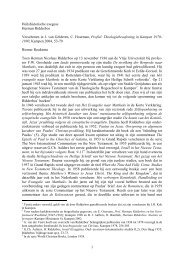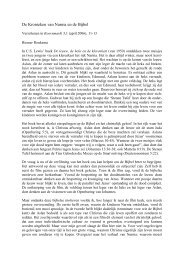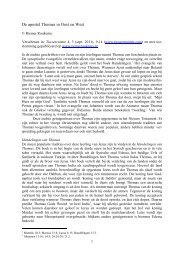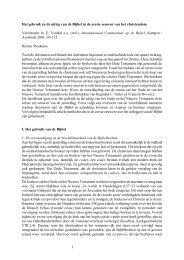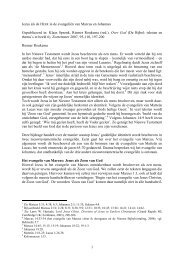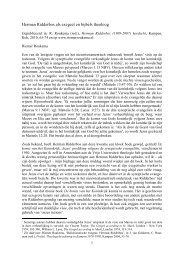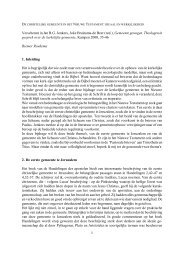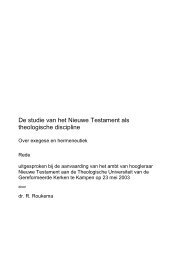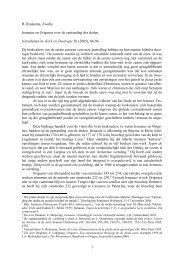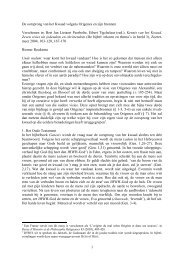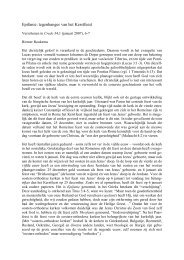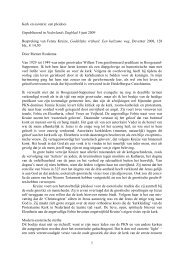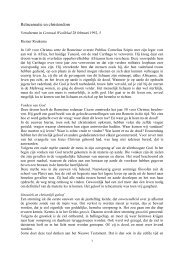Herman Ridderbos‟s Redemptive -historical ... - Riemer Roukema
Herman Ridderbos‟s Redemptive -historical ... - Riemer Roukema
Herman Ridderbos‟s Redemptive -historical ... - Riemer Roukema
You also want an ePaper? Increase the reach of your titles
YUMPU automatically turns print PDFs into web optimized ePapers that Google loves.
<strong>Redemptive</strong> History and the New Testament Scriptures (1955 in Dutch)<br />
In <strong>Redemptive</strong> History and the New Testament Scriptures Ridderbos shows what the<br />
implications are of his view on redemptive history for the origin and the authority of<br />
the New Testament canon. He argues that the history of the canon is part of church<br />
history and not of redemptive history (12; 16). 44 Nevertheless, he argues that the<br />
authority of the New Testament canon is rooted in redemptive history, i.e. in Christ.<br />
In his view, “Christ established a formal authority structure to be the source and<br />
standard for all future preaching of the gospel” (13; italics H. N. R.). This implies<br />
that Christ wished his apostles to pass on – orally and in writing – that which took<br />
place in the fullness of time (Galatians 4:4). Ridderbos therefore speaks of “continuing<br />
revelation” (15). The writings of the apostles include the written record of the<br />
oral tradition, which is borne by the exalted Christ (15-22). Ridderbos also refers to<br />
inspiration by the Holy Spirit (14; 29-30). He defends the intended closed character<br />
of the canon (25-30). He maintains that not all New Testament writings need to be<br />
written by apostles, but that the important thing is that they contain the apostolic<br />
tradition (32). He argues that the canon in its redemptive-<strong>historical</strong> meaning is not<br />
the product of the Christian community, but rather that the Christian community is<br />
destined to be the product of this canon (25). Thus the canon has produced the<br />
church (40).<br />
In setting out his arguments, he appeals to Cullmann several times. 45 It is<br />
clear that Ridderbos‟s view that the establishment of the canon was intended by<br />
Christ correlates with his view that Christ did not intend to give the impression that<br />
He would come back soon. In this view there is therefore a time for the church, and<br />
Christ did not only leave his Spirit, but also the New Testament canon.<br />
After arguing the place the New Testament canon takes in redemptive history<br />
and thereby in Christ‟s will of intention, Ridderbos discusses the character of the<br />
authority of the New Testament. On the one hand he states that the one thing that<br />
will make or break the authority of the New Testament message is the factuality of<br />
the <strong>historical</strong> events which it proclaims (55). On the other hand he sees that the<br />
gospel writers wrote with relative freedom in presenting the witness they had<br />
received and in their use of each other‟s writings (66). He qualifies the authority of<br />
the New Testament scriptures as follows: “The New Testament is not a book of<br />
revelation in the sense that all of its pronouncements intend, directly or indirectly, to<br />
give answers to the questions with which life confronts us” (57). The New Testament‟s<br />
teaching “is certainly not intended to provide us with all sorts of theoretical<br />
and practical teaching or insight, which as such do not proceed from the revelation<br />
of God in Jesus Christ” (74). Ridderbos then points at the redemptive-<strong>historical</strong><br />
character of the knowledge that the New Testament imparts (75). It becomes<br />
apparent that the term “redemptive-<strong>historical</strong>” here obtains a restrictive meaning as<br />
regards the fundamentalist interpretation of Scriptures, according to which not only<br />
44 The references are given to the pages in the second revised translation (cf. n. 14).<br />
45 Yet Cullmann also places accents that differ from Ridderbos. For instance, in La Tradition.<br />
Problème exégétique, historique et théologique (Neuchâtel / Paris: Delachaux et Niestle, 1953), 43,<br />
he states : “Nous sommes absolument d‟accord avec la théologie catholique lorsqu‟elle insiste sur le<br />
fait que l‟Eglise elle-même a fait le Canon” (“We absolutely agree with Catholic theology where it<br />
insists that the Church itself made the Canon.”) (italics O. C.).<br />
9



